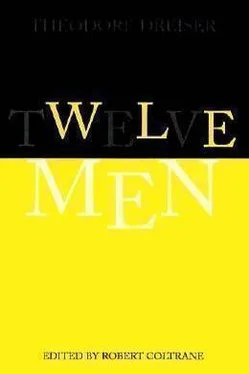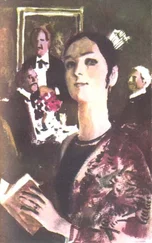Теодор Драйзер - Twelve Men
Здесь есть возможность читать онлайн «Теодор Драйзер - Twelve Men» весь текст электронной книги совершенно бесплатно (целиком полную версию без сокращений). В некоторых случаях можно слушать аудио, скачать через торрент в формате fb2 и присутствует краткое содержание. Год выпуска: 2014, Издательство: epubBooks Classics, Жанр: Биографии и Мемуары, на английском языке. Описание произведения, (предисловие) а так же отзывы посетителей доступны на портале библиотеки ЛибКат.
- Название:Twelve Men
- Автор:
- Издательство:epubBooks Classics
- Жанр:
- Год:2014
- ISBN:нет данных
- Рейтинг книги:4 / 5. Голосов: 1
-
Избранное:Добавить в избранное
- Отзывы:
-
Ваша оценка:
- 80
- 1
- 2
- 3
- 4
- 5
Twelve Men: краткое содержание, описание и аннотация
Предлагаем к чтению аннотацию, описание, краткое содержание или предисловие (зависит от того, что написал сам автор книги «Twelve Men»). Если вы не нашли необходимую информацию о книге — напишите в комментариях, мы постараемся отыскать её.
Twelve Men — читать онлайн бесплатно полную книгу (весь текст) целиком
Ниже представлен текст книги, разбитый по страницам. Система сохранения места последней прочитанной страницы, позволяет с удобством читать онлайн бесплатно книгу «Twelve Men», без необходимости каждый раз заново искать на чём Вы остановились. Поставьте закладку, и сможете в любой момент перейти на страницу, на которой закончили чтение.
Интервал:
Закладка:
In this of course he was hampered by the law before mentioned, which declared that no city could abolish its grade crossings without having first submitted the matter to the people during three successive years and obtained their approval each time. Behind this law was not now, however, as in the case of the gas company, a small $500,000 corporation, but all the railroads which controlled New England, and to which brains and legislators, courts and juries, were mere adjuncts. Furthermore, the question would have to be voted on at the same time as his candidacy, and this would have deterred many another more ambitious politician. The mayor was not to be deterred, however. He began his agitation, and the enemy began theirs, but in the midst of what seemed to be a fair battle the great railway company endeavored to steal a march. There was suddenly and secretly introduced into the lower house of the State legislature a bill which in deceptive phraseology declared that the law which allowed all cities, by three successive votes, to abolish grade crossings in three years, was, in the case of a particular city mentioned, hereby abrogated for a term of four years. The question might not even be discussed politically.
When the news of this attempt reached the mayor, he took the first train for the State capitol and arrived there just in time to come upon the floor of the house when the bill was being taken up for discussion. He asked leave to make a statement. Great excitement was aroused by his timely arrival. Those who secretly favored the bill endeavored to have the matter referred to a committee, but this was not to be. One member moved to go on with the consideration of the bill, and after a close vote the motion carried.
The mayor was then introduced.
After a few moments, in which the silent self–communing with which he introduced himself impressed everyone with his sincerity, he said:
"I am accused of objecting to this measure because its enactment will remove, as a political issue, the one cause upon which I base my hope for reëlection. If there are no elevated crossings to vote for, there will be no excuse for voting for me. Gentlemen, you mistake the temper and the intellect of the people of our city. It is you who see political significance in this thing, but let me assure you that it is of a far different kind from that which you conceive. If the passing of this measure had any significance to me other than the apparent wrong of it, I would get down on my knees and urge its immediate acceptance. Nothing could elect me quicker. Nothing could bury the opposition further from view. If you wish above all things to accomplish my triumph you will only need to interfere with the rights of our city in this arbitrary manner, and you will have the thing done. I could absolutely ask nothing more."
The gentlemen who had this measure in charge weighed well these assertions and trifled for weeks with the matter, trying to make up their minds.
Meanwhile election time approached, and amid the growing interest of politics it was thought unwise to deal with it. A great fight was arranged for locally, in which every conceivable element of opposition was beautifully harmonized by forces and conceptions which it is almost impossible to explain. Democrats, republicans, prohibitionists, saloon men and religious circles, all were gathered into one harmonious body and inspired with a single idea, that of defeating the mayor. From some quarter, not exactly identified, was issued a call for a civic committee of fifty, which should take into its hands the duty of rescuing the city from what was termed a "throttling policy of commercial oppression and anarchy." Democrats, republicans, liquor and anti–liquorites, were invited to the same central meeting place, and came. Money was not lacking, nor able minds, to prepare campaign literature. It was openly charged that a blank check was handed in to the chairman of this body by the railway whose crossings were in danger, to be filled out for any amount necessary to the destruction of the official upstart who was seeking to revolutionize old methods and conditions.
As may be expected, this opposition did not lack daring in making assertions contrary to facts. Charges were now made that the mayor was in league with the railroad to foist upon the city a great burden of expense, because the law under which cities could compel railroads to elevate their tracks declared that one–fifth of the burden of expense must be borne by the city and the remaining four–fifths by the railroad. It would saddle a debt of $250,000 upon the taxpayers, they said, and give them little in return. All the advantage would be with the railroad. "Postpone this action until the railroad can be forced to bear the entire expense, as it justly should," declared handbill writers, whose services were readily rendered to those who could afford to pay for them.
The mayor and his committee, although poor, answered with handbills and street corner speeches, in which he showed that even with the extravagantly estimated debt of $250,000, the city's tax–rate would not be increased by quite six cents to the individual. The cry that each man would have to pay five dollars more each year for ten years was thus wholesomely disposed of, and the campaign proceeded.
Now came every conceivable sort of charge. If he were not defeated, all reputable merchants would surely leave the city. Capital was certainly being scared off. There would be idle factories and empty stomachs. Look out for hard times. No one but a fool would invest in a city thus hampered.
In reply the mayor preached a fair return by corporations for benefits received. He, or rather his organization, took a door–to–door census of his following, and discovered a very considerable increase in the number of those intending to vote for him. The closest calculations of the enemy were discovered, the actual number they had fixed upon as sufficient to defeat him. This proved to the mayor that he must have three hundred more votes if he wished to be absolutely sure. These he hunted out from among the enemy, and had them pledged before the eventual morning came.
The night preceding election ended the campaign, for the enemy at least, in a blaze of glory, so to speak. Dozens of speakers for both causes were about the street corners and in the city meeting room.
Oratory poured forth in streams, and gasoline–lighted band–wagons rattled from street to street, emitting song and invective. Even a great parade was arranged by the anti–mayoral forces, in which horses and men to the number of hundreds were brought in from nearby cities and palmed off as enthusiastic citizens.
"Horses don't vote," a watchword handed out by the mayor, took the edge off the extreme ardor of this invading throng, and set to laughing the hundreds of his partisans, who needed such encouragement.
Next day came the vote, and then for once, anyhow, he was justified. Not only was a much larger vote cast than ever, but he thrashed the enemy with a tail of two hundred votes to spare. It was an inspiring victory from one point of view, but rather doleful for the enemy. The latter had imported a carload of fireworks, which now stood sadly unused upon the very tracks which, apparently, must in the future be raised. The crowning insult was offered when the successful forces offered to take them off their hands at half price.
For a year thereafter (a mayor was elected yearly there), less was heard of the commercial destruction of the city. Gas stood, as decided, at eighty cents a thousand. A new manual training school, built at a very nominal cost, a monument to municipal honesty, was also in evidence. The public waterworks had also been enlarged and the rates reduced. The streets were clean.
Then the mayor made another innovation. During his first term of office there had been a weekly meeting of the reform club, at which he appeared and talked freely of his plans and difficulties. These meetings he now proposed to make public.
Читать дальшеИнтервал:
Закладка:
Похожие книги на «Twelve Men»
Представляем Вашему вниманию похожие книги на «Twelve Men» списком для выбора. Мы отобрали схожую по названию и смыслу литературу в надежде предоставить читателям больше вариантов отыскать новые, интересные, ещё непрочитанные произведения.
Обсуждение, отзывы о книге «Twelve Men» и просто собственные мнения читателей. Оставьте ваши комментарии, напишите, что Вы думаете о произведении, его смысле или главных героях. Укажите что конкретно понравилось, а что нет, и почему Вы так считаете.









